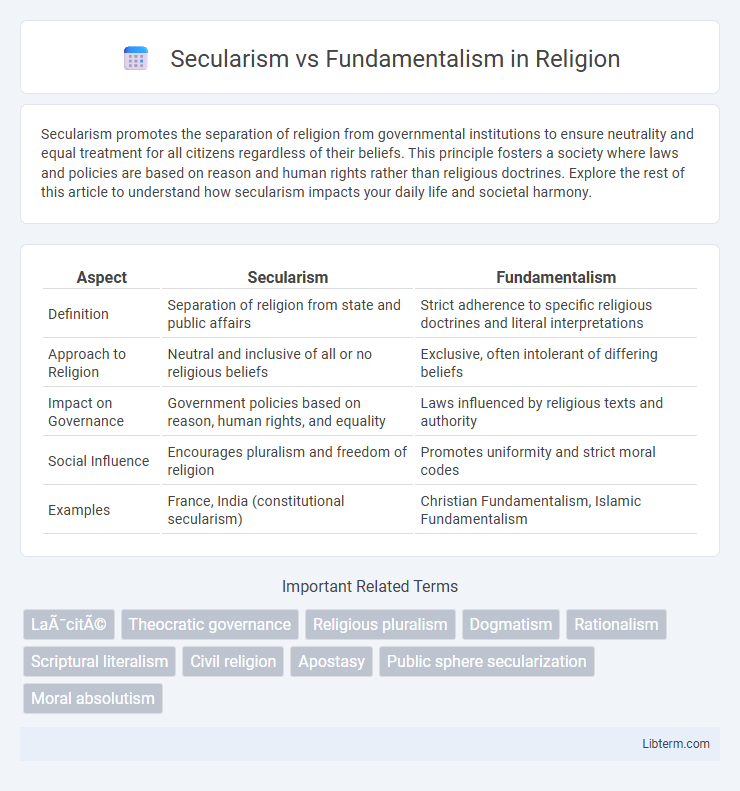Secularism promotes the separation of religion from governmental institutions to ensure neutrality and equal treatment for all citizens regardless of their beliefs. This principle fosters a society where laws and policies are based on reason and human rights rather than religious doctrines. Explore the rest of this article to understand how secularism impacts your daily life and societal harmony.
Table of Comparison
| Aspect | Secularism | Fundamentalism |
|---|---|---|
| Definition | Separation of religion from state and public affairs | Strict adherence to specific religious doctrines and literal interpretations |
| Approach to Religion | Neutral and inclusive of all or no religious beliefs | Exclusive, often intolerant of differing beliefs |
| Impact on Governance | Government policies based on reason, human rights, and equality | Laws influenced by religious texts and authority |
| Social Influence | Encourages pluralism and freedom of religion | Promotes uniformity and strict moral codes |
| Examples | France, India (constitutional secularism) | Christian Fundamentalism, Islamic Fundamentalism |
Introduction to Secularism and Fundamentalism
Secularism promotes the separation of religion from governmental institutions, ensuring that public policies and laws are based on reason and universal human rights rather than religious doctrines. Fundamentalism, by contrast, advocates for a strict adherence to specific religious beliefs and often seeks to influence or control political and social systems in accordance with these doctrines. Understanding the core principles of secularism and fundamentalism reveals key tensions between pluralistic governance and the desire for religious authority in shaping societal norms.
Historical Origins and Evolution
Secularism emerged during the Enlightenment era in the 17th and 18th centuries, promoting the separation of religion from political and public life to foster individual rights and scientific progress. In contrast, fundamentalism originated in the early 20th century as a reactionary movement defending perceived traditional religious truths against modernist interpretations and secular influences. The evolution of secularism reflects increasing globalization and democratization, whereas fundamentalism often intensifies during periods of social upheaval and cultural conflict.
Core Principles of Secularism
Secularism is grounded in the separation of religion from government, ensuring that state institutions remain neutral in religious matters to protect individual freedoms. It advocates for equal treatment of all citizens regardless of their faith, emphasizing rationality, freedom of thought, and the rule of law as foundational principles. This framework promotes societal harmony by preventing religious dominance and fostering inclusive policy-making based on universal human rights.
Key Tenets of Fundamentalism
Fundamentalism emphasizes strict adherence to religious doctrines, often advocating for literal interpretations of sacred texts and rejecting modernist influences. Key tenets include the belief in absolute moral truths, the necessity of returning to original religious values, and opposition to secularism and pluralism. This worldview promotes religious authority in societal governance, resisting secular legal and educational systems.
Differences in Worldview and Philosophy
Secularism emphasizes the separation of religion from governmental institutions, promoting a worldview based on reason, scientific inquiry, and human rights, while fundamentalism insists on adhering strictly to specific religious doctrines and views these as the ultimate authority for social and political life. Secular philosophy values pluralism and individual freedoms, encouraging diverse beliefs to coexist without religious interference, contrasting sharply with fundamentalist ideology that often seeks to enforce uniformity based on perceived divine laws. The fundamentalist worldview perceives religion as an absolute truth guiding all aspects of existence, whereas secularism prioritizes empirical evidence and rational thought to address societal and ethical issues.
Political Implications and Governance
Secularism promotes the separation of religion from state affairs, ensuring laws and policies are based on rational, inclusive principles that accommodate diverse beliefs, thus fostering democratic governance and protecting individual rights. Fundamentalism, by contrast, often seeks to impose religious doctrines on political systems, potentially undermining pluralism and triggering conflicts over law-making and civil liberties. The clash between secularism and fundamentalism significantly shapes legislative frameworks, electoral dynamics, and the overall stability of political institutions.
Social Impact and Community Relations
Secularism promotes social cohesion by encouraging pluralism and protecting individual rights, which helps reduce religious conflicts and fosters inclusive community relations. Fundamentalism often leads to social fragmentation through rigid belief systems that may marginalize minority groups and incite intolerance or violence. The tension between these ideologies shapes societal dynamics, influencing policy-making, education, and intergroup dialogue across diverse populations.
Secularism vs Fundamentalism in Education
Secularism in education promotes a neutral curriculum that emphasizes critical thinking, scientific inquiry, and inclusivity, ensuring that no particular religion influences teaching content or school policies. Fundamentalism in education often enforces strict adherence to specific religious doctrines, which can limit academic freedom and marginalize diverse perspectives within the learning environment. Balancing secular principles with respect for cultural identities remains essential to fostering open-mindedness and preventing ideological bias in schools.
Contemporary Global Examples
Secularism promotes the separation of religion from state affairs, ensuring religious neutrality in governance, as seen in countries like India and France where secular constitutions uphold diverse religious freedoms. Fundamentalism emphasizes strict adherence to specific religious doctrines, evident in movements such as Islamic fundamentalism in the Middle East and Evangelical Christian fundamentalism in the United States. Contemporary conflicts, such as the debates over Sharia law in Nigeria and the rise of Hindu nationalism in India, highlight the tensions between secular governance and religious fundamentalism on the global stage.
Challenges and the Path Forward
Secularism faces challenges from fundamentalism through rigid ideologies that resist pluralism and undermine democratic values, often leading to social polarization and conflict. Addressing these challenges requires promoting inclusive education, safeguarding freedom of belief, and encouraging interfaith dialogue to build mutual respect and understanding. The path forward involves balancing secular governance with cultural sensitivities to ensure rights and coexistence in diverse societies.
Secularism Infographic

 libterm.com
libterm.com